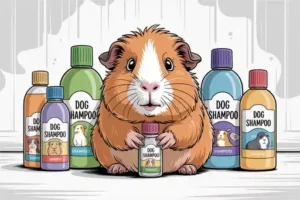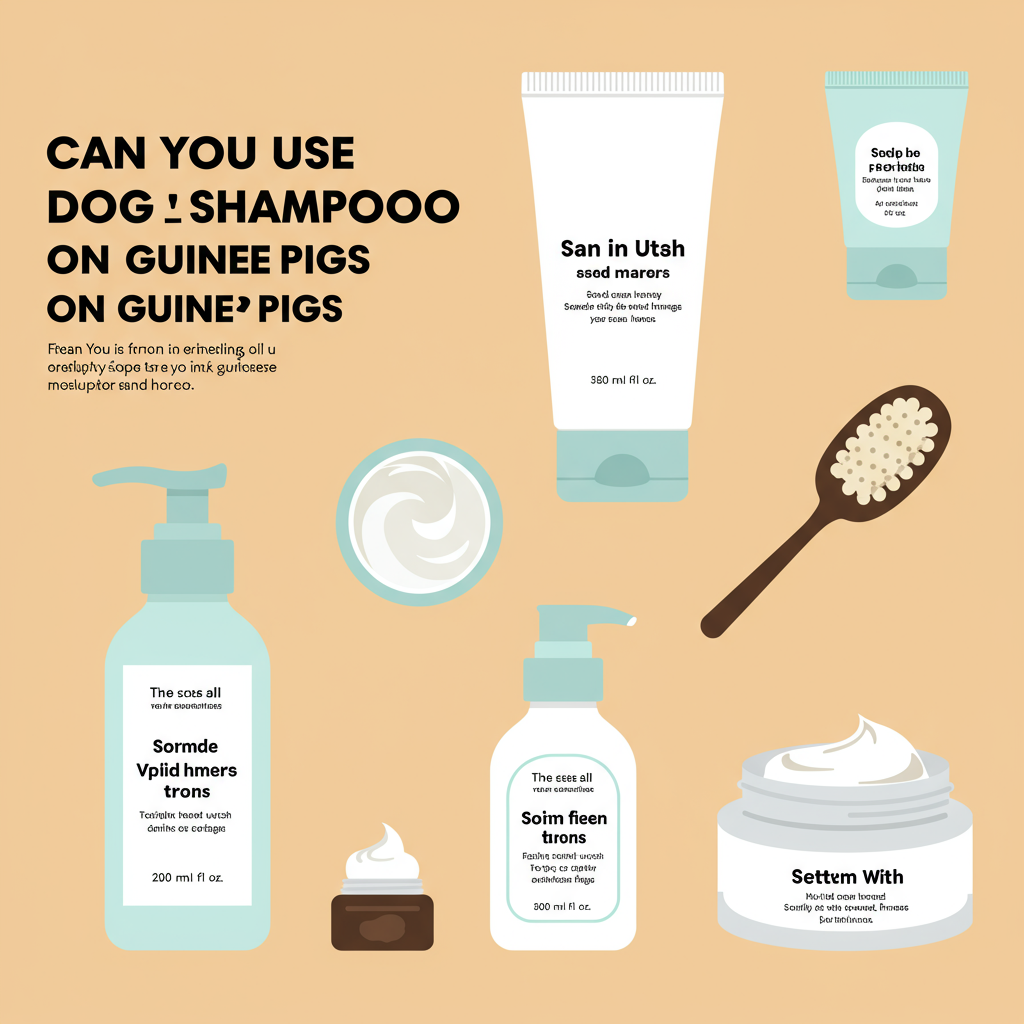
This comprehensive guide will dive deep into why dog shampoo is generally not safe for guinea pigs, exploring the crucial differences in skin pH, ingredient sensitivities, and the risks involved. We’ll also cover when a bath is truly necessary for your guinea pig, the correct and safest methods for bathing, and recommend appropriate alternatives to ensure your beloved pet stays clean, healthy, and happy. Understanding these details is key to providing optimal care and avoiding unnecessary stress or health complications for your small companion.
The Short Answer: Can You Use Dog Shampoo On Guinea Pigs?
Let’s get straight to the point: No, you generally should not use dog shampoo on guinea pigs. While it might seem like a harmless shortcut, the reality is that canine and cavy skin are fundamentally different. Dog shampoos are formulated specifically for dogs, taking into account their skin’s pH levels, coat types, and common dermatological needs. These formulations are often too harsh, contain ingredients that are toxic, or simply aren’t suitable for the sensitive skin of a guinea pig.
Using a product not designed for guinea pigs can lead to a range of problems, from mild skin irritation and dryness to severe allergic reactions, chemical burns, or even systemic toxicity if ingested. Your guinea pig’s well-being is paramount, and choosing the right bathing product is a critical part of their care. Always opt for shampoos specifically formulated for guinea pigs or, in a pinch and with caution, very mild, unscented baby shampoo, as we’ll discuss later.
Why Dog Shampoo Isn’t Safe for Guinea Pigs
Understanding the “why” behind this recommendation is crucial for responsible pet ownership. Several factors contribute to why dog shampoos are a poor and potentially dangerous choice for your guinea pig.
Skin pH Differences
One of the most significant reasons you shouldn’t use dog shampoo on guinea pigs is the difference in skin pH levels. Human skin has an average pH of around 5.5, dogs typically range from 6.2 to 7.4, and guinea pigs have a skin pH that is generally more acidic, falling closer to the human range, often between 5.0 and 6.0. Dog shampoos are designed to maintain a dog’s specific pH balance. Using a shampoo with an incompatible pH on a guinea pig can strip their skin of its natural protective oils, leading to:
- Dryness and Flakiness: The skin can become excessively dry, leading to discomfort.
- Irritation and Itching: An imbalanced pH can cause intense itching, leading to scratching and potential skin lesions.
- Increased Susceptibility to Infections: A compromised skin barrier is less effective at warding off bacteria and fungi.
Harsh Ingredients and Chemicals
Many dog shampoos contain ingredients that are perfectly safe for canines but can be highly irritating or even toxic to guinea pigs. These can include:
- Strong Detergents (Sulfates): While effective at cleaning, these can be too harsh for sensitive guinea pig skin, stripping away essential oils and causing dryness.
- Artificial Fragrances and Dyes: These are common allergens and irritants. Guinea pigs have a keen sense of smell, and strong scents can be overwhelming and stressful, potentially causing respiratory issues.
- Essential Oils: Popular in many “natural” dog shampoos, essential oils like tea tree oil, peppermint, or citrus oils can be toxic to guinea pigs, even in small amounts, if absorbed through the skin or ingested.
- Insecticides/Flea Treatments: Some dog shampoos contain pyrethrins or other insecticides for flea and tick control. These are highly toxic to small animals like guinea pigs and can cause severe neurological problems or death.
- Conditioning Agents: While beneficial for dog coats, certain conditioners may contain ingredients that are too heavy or irritating for guinea pig fur and skin.
Risk of Skin Irritation and Allergic Reactions
Even if a dog shampoo doesn’t contain overtly toxic ingredients, its general formulation can still cause significant problems. Guinea pigs have incredibly delicate skin. Exposure to unsuitable chemicals can result in:
- Redness and Inflammation: The skin may become visibly irritated and inflamed.
- Rash and Hives: Allergic reactions can manifest as bumpy rashes or hives.
- Hair Loss: Severe irritation can lead to patches of hair loss.
- Pain and Discomfort: Your guinea pig may show signs of distress, such as squeaking, attempting to scratch excessively, or lethargy.
Ingestion Concerns
Guinea pigs are meticulous groomers. After a bath, they will inevitably lick and groom themselves to dry and neaten their fur. Any residue of dog shampoo left on their coat can be ingested. Given the potential toxicity of many dog shampoo ingredients, this can lead to internal problems, including:
- Gastrointestinal Upset: Vomiting, diarrhea, or loss of appetite.
- Organ Damage: In severe cases, toxic ingredients can harm internal organs.
- Neurological Issues: Symptoms like tremors, disorientation, or seizures, especially if insecticide-based shampoos are used.
When Do Guinea Pigs Need a Bath?
Unlike dogs, guinea pigs are generally very clean animals who spend a good portion of their day grooming themselves and their cage mates. Therefore, full baths should be a rare occurrence. In most cases, a full bath is unnecessary and can even be stressful for your guinea pig, potentially leading to a chill or other health issues if not done correctly.
So, when is a bath actually warranted? Here are the primary situations:
- Severe Soiling: If your guinea pig has gotten extremely messy with urine, feces, or another substance that they cannot clean themselves, or if the substance is sticky or harmful.
- Grease Gland Buildup: Male guinea pigs (boars) have a grease gland near the base of their spine that can become very oily and matted, attracting dirt. This area may require occasional spot cleaning with a mild shampoo.
- Matting: Long-haired breeds, especially, can develop mats in their fur that are difficult to remove by brushing alone. A bath can help loosen these, but often careful trimming is preferred.
- Veterinary Recommendation: In cases of certain skin conditions, parasites, or post-operative care, your veterinarian might recommend a therapeutic bath with a specific medicated shampoo. Always follow their instructions precisely.
- Odor: If your guinea pig has a persistent strong odor despite regular cage cleaning and good hygiene, a bath might be considered, though often a good spot clean or dry shampoo is sufficient.
For most minor messes, a quick spot clean with a damp cloth or a waterless shampoo is usually enough, avoiding the stress of a full bath.
The Right Way to Bathe Your Guinea Pig
If a bath is absolutely necessary, it’s crucial to do it correctly to minimize stress and ensure your guinea pig’s safety and comfort.
Choosing the Right Shampoo
This is the most critical step. Forget asking, “Can you use dog shampoo on guinea pigs?” Instead, reach for:
- Guinea Pig Specific Shampoos: These are formulated with the correct pH and gentle ingredients suitable for their sensitive skin. Look for products clearly labeled for guinea pigs or small animals.
- Unscented Baby Shampoo (Use with Extreme Caution): In an absolute emergency, a very small amount of tear-free, unscented baby shampoo can be used as a last resort. It must be heavily diluted (e.g., a pea-sized amount in a cup of water) and rinsed meticulously. This should not be a regular solution.
Preparation is Key
Gather everything you need beforehand to make the process quick and smooth:
- Two small basins or sinks: One for washing, one for rinsing.
- Lukewarm water: Test with your elbow; it should be comfortably warm, not hot or cold.
- Guinea pig specific shampoo: Or diluted baby shampoo.
- Several soft, absorbent towels: For drying.
- Hairdryer (optional): On the lowest, coolest setting, held far away, only if your guinea pig tolerates it.
- Treats: For positive reinforcement afterward.
- A calm environment: Minimize noise and distractions.
The Bathing Process (Step-by-Step)
- Fill Basins: Fill the washing basin with about 1-2 inches of lukewarm water, and the rinsing basin with clean, lukewarm water.
- Gentle Introduction: Slowly and gently place your guinea pig into the washing basin, supporting their chest and hindquarters. Keep their head above water at all times. Talk to them calmly.
- Apply Shampoo: Apply a small amount of diluted shampoo, working it gently into their fur, avoiding their face, eyes, and ears. Focus on soiled areas. For the grease gland, you might need to rub a bit more firmly.
- Rinse Thoroughly: Transfer your guinea pig to the rinsing basin. Rinse all shampoo out completely. Residue can cause skin irritation. You may need to use a cup to gently pour clean water over their body, again avoiding the head. Ensure the water in the rinsing basin remains clear.
- Initial Drying: Immediately wrap your guinea pig in a soft, dry towel. Gently pat and rub to remove as much water as possible.
- Final Drying: Use fresh, dry towels to continue drying. If your guinea pig tolerates it, you can use a hairdryer on the lowest, coolest setting, keeping it at a safe distance and moving it constantly to prevent overheating. Never use high heat. Ensure they are completely dry to prevent chills and respiratory issues.
Post-Bath Care
Once dry, return your guinea pig to a clean, warm cage. Offer them some favorite treats and monitor them closely for any signs of stress, chills, or irritation. Ensure their environment is draft-free and warm for several hours after the bath.
Safe Alternatives to Dog Shampoo for Guinea Pigs
Beyond asking, “Can you use dog shampoo on guinea pigs?” it’s important to know what products are genuinely safe and effective for keeping your guinea pig clean.
- Guinea Pig Specific Shampoos: As mentioned, these are your best bet. Brands like Kaytee, Small Pet Select, or Living World often have good options formulated for small animals.
- Unscented Baby Shampoo (Limited Use): Only for emergencies and always heavily diluted. It’s designed to be gentle on human baby skin, which is closer in sensitivity to guinea pig skin than dog skin, but still not ideal.
- Waterless Shampoos/Wipes for Small Animals: For spot cleaning or quick freshen-ups, these can be a great alternative to a full bath. Look for products specifically for small pets, or even gentle, unscented pet wipes. Always check ingredients to ensure they are safe for ingestion.
- Cornstarch or Talc-Free Baby Powder: For oily coats or the grease gland area, a light dusting of pure cornstarch (ensure it’s not medicated or scented) can help absorb excess oil and be brushed out. Never use talcum powder, as it can be harmful if inhaled.
- Plain Warm Water: For very minor messes, a quick rinse with just warm water can sometimes be enough.
What to Do If You Accidentally Used Dog Shampoo
Mistakes can happen. If you’ve accidentally used dog shampoo on your guinea pig, don’t panic, but act quickly:
- Rinse Immediately and Thoroughly: The most crucial step is to rinse your guinea pig’s fur and skin with clean, lukewarm water for an extended period. Ensure absolutely no shampoo residue remains.
- Dry Completely: Follow the thorough drying steps outlined above to prevent chilling.
- Monitor Closely: Over the next 24-48 hours, watch your guinea pig for any signs of irritation, discomfort, or illness. Look for redness, scratching, lethargy, loss of appetite, vomiting, diarrhea, or unusual behavior.
- Contact Your Vet: If you observe any adverse symptoms, contact your veterinarian immediately. Be prepared to tell them the brand and type of dog shampoo used, as this information can be vital for treatment.
Recommended Products
Guinea Pig Specific Shampoo
Formulated with the right pH and gentle ingredients, these shampoos are the safest choice for bathing your guinea pig when necessary. Always check reviews for guinea pig suitability.
Small Animal Waterless Shampoo
Excellent for spot cleaning or quick freshen-ups without the stress of a full bath. Look for unscented, gentle formulas designed for small pets like guinea pigs.
Unscented Baby Wipes
For minor messes or quick clean-ups, gentle, fragrance-free baby wipes can be used cautiously on localized dirty areas, avoiding eyes and mouth.
Frequently Asked Questions About Guinea Pig Bathing
Q1: Can I use human shampoo on my guinea pig?
A: No, generally not recommended. While human baby shampoo is sometimes suggested as a last resort due to its mildness compared to dog shampoo, adult human shampoos are often too harsh. They contain perfumes, dyes, and stronger detergents that can irritate a guinea pig’s sensitive skin and disrupt their natural pH balance, leading to dryness or allergic reactions. Always prioritize guinea pig-specific shampoos.
Q2: How often should I bathe my guinea pig?
A: Guinea pigs are very clean animals and typically do not need frequent baths. Most guinea pigs will only need a bath a few times a year at most, and many can go their entire lives with just spot cleaning. Long-haired breeds or those with grease gland issues may require more frequent attention, but still, a full bath should be a rare event to avoid stress and skin issues.
Q3: What are the signs of skin irritation in guinea pigs?
A: Signs of skin irritation include excessive scratching, redness, flaking skin, scabs, hair loss in patches, visible rashes, or a dull, unhealthy coat. Your guinea pig might also appear lethargic, lose their appetite, or show signs of discomfort like squeaking when touched. If you notice any of these symptoms after a bath or otherwise, consult your vet.
Q4: Is baby shampoo truly safe for guinea pigs?
A: Unscented, tear-free baby shampoo can be used as a very last resort if no guinea pig-specific shampoo is available and a bath is absolutely necessary. It must be heavily diluted (e.g., a pea-sized amount in a cup of warm water) and rinsed extremely thoroughly. It is not an ideal or regular solution. Guinea pig shampoos are always the preferred and safest option.
Q5: Can I use dish soap on my guinea pig for extreme messes?
A: Absolutely not. Dish soap, even mild varieties, is designed to cut through grease and is extremely harsh. It will strip your guinea pig’s skin of all its natural oils, severely irritate it, and can cause significant dryness, flaking, and pain. Dish soap is never an appropriate bathing solution for any pet.
Q6: What’s the best way to keep my guinea pig clean without bathing?
A: The best way to keep your guinea pig clean is through excellent cage hygiene (daily spot cleaning, weekly full cleans), regular brushing (especially for long-haired breeds), and spot cleaning with a damp cloth or pet-safe waterless shampoo/wipes for minor messes. Healthy guinea pigs are natural groomers, and a clean environment goes a long way in keeping them fresh.
Conclusion
The question, “Can you use dog shampoo on guinea pigs?” has a clear and resounding answer: it is strongly advised against. The vast physiological differences between dogs and guinea pigs, particularly concerning skin pH and ingredient sensitivities, make dog shampoos a potentially harmful choice. Prioritizing your guinea pig’s health and comfort means understanding these distinctions and opting for products specifically designed for their delicate systems.

Remember that bathing guinea pigs should be a rare event, only undertaken when absolutely necessary and with the right tools. Always choose a reputable guinea pig-specific shampoo, ensure a stress-free environment, and follow proper bathing and drying techniques. By being informed and proactive, you can ensure your beloved guinea pig remains clean, healthy, and happy without exposing them to unnecessary risks. When in doubt, always consult your veterinarian for the best advice tailored to your pet’s needs.
